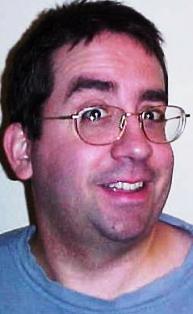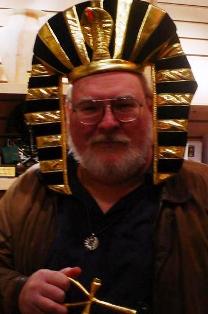Edits to gay soldier’s Wikipedia entry traced to Pentagon
Anonymous user deleted references to sexual orientation
By CHRIS JOHNSON, Washington Blade | Apr 3, 12:49 PM A Wikipedia article about Maj. Alan Rogers, a gay soldier who was killed in January in Iraq, was apparently edited by someone in the Pentagon, who removed any mention that Rogers was gay.
A Wikipedia article about Maj. Alan Rogers, a gay soldier who was killed in January in Iraq, was apparently edited by someone in the Pentagon, who removed any mention that Rogers was gay.  The user on Monday redacted details about Rogers that appeared on the online encyclopedia site. Information that was deleted included Rogers’ sexual orientation; the soldier’s participation in American Veterans for Equal Rights, a group that works to change military policy toward gays; and the fact that Rogers’ death helped bring the U.S. military’s casualty toll in Iraq to 4,000.
The user on Monday redacted details about Rogers that appeared on the online encyclopedia site. Information that was deleted included Rogers’ sexual orientation; the soldier’s participation in American Veterans for Equal Rights, a group that works to change military policy toward gays; and the fact that Rogers’ death helped bring the U.S. military’s casualty toll in Iraq to 4,000.
Rob Pilaud, a patent agent and a friend of Rogers who attended the soldier’s funeral, restored the information to the Wikipedia article the next day. Pilaud was among Rogers’ friends who created the Wikipedia page.
The anonymous poster also provided the following comment in the “discussion” section about the article: “Alan’s life was not about his sexual orientation but rather about the body of work he performed ministering to others and helping the defense of the country,” the poster wrote. “Quit trying to press an agenda that Alan wouldn’t have wanted made public just to suit your own ends.” The IP address attached to the deletion of the details and the posted comments is 141.116.168.135. The address belongs to a computer from the office of the Army Deputy Chief of Staff for Intelligence (G-2) at the Pentagon. The office is headed by Lt. Gen. John Kimmons, who was present at Rogers’ funeral and presented the flag from Rogers’ coffin to his cousin, Cathy Long.
The Army’s public affairs office did not return a call seeking comment.
Pilaud noted that while the computer where the changes originated can be found, the identity of the user remains unknown. “Obviously, we still don’t know who accessed the computer at this IP address — it could have been a general, it could have been a civilian contractor, it could have been anyone with access to their computer,” he said. At Rogers’ funeral Kimmons acted “very business-like” and was respectful toward the fallen soldier and his family, Pilaud said. Pilaud is asking Rogers’ friends for biographical information on the fallen solider to enhance the Wikipedia article. Pilaud said he thinks the online article should “be a balanced view of his life,” disclose the fact that Rogers was gay and discuss Rogers’ feelings on military policy toward gays. “With Wikipedia, at least, I simply want to present objective information about Alan — about who he was, what he did with his life and what he would have wanted,” he said.
[...6IP....]
The Post’s decision to omit Rogers’ sexual orientation from its coverage is the not first time a major media source withheld such information. When filmmaker Ismail Merchant died in 2005, most mainstream media sources did not mention that James Ivory was his partner. Similarly, many media outlets did not mention that Susan Sontag had a female partner in coverage of her death in 2004.
Roy Clark, a senior scholar and the vice president of the Poynter Institute, a journalism school based in St. Petersburg, Fla., said the Post made “a big mistake” by not disclosing information on Rogers’ sexual orientation in the article about him. Clark emphasized that he spoke for himself and not on behalf of the Poynter Institute. “It’s obvious that … this was not just a private part of his life, but it was a public part of his life and his identity and his belief system,” he said. With matters relating to sexual orientation still a matter of debate in the United States, Rogers’ sexual orientation would have been a newsworthy portion of the story, Clark said.
Eric Hegedus, president of the National Lesbian and Gay Journalists’ Association, said the Post ombudsman deserves commendation for arguing that the Post could have gone further in the story. Hegedus said it was ridiculous for the Post to omit that Rogers was a treasurer in the American Veterans for Equal Rights. “If he was a former treasurer, it’s something that he was passionate about and why wouldn’t you mention something like that?” Hegedus asked.
Rashad Robinson, senior director of media programs at the Gay & Lesbian Alliance Against Defamation (GLAAD), said the Post had to make a “difficult call” regarding whether or not include Rogers’ sexual orientation in the article, but ultimately “made a bad decision.” “The story would have been much richer and much more appropriate if it included the voices and reaction from the major’s friends and family,” Robinson said. The matter is complicated by “Don’t Ask, Don’t Tell” as it makes it hard to know if soldiers were closeted in some arenas because of that or would have chosen to not be out regardless of the controversial policy, which prevents service members from serving openly. Robinson said in this situation, “Don’t Ask, Don’t Tell” is the enemy, not the Post. Robinson said the Post ombudsman’s column shows that progress has been made because such an article probably wouldn’t have been published four years ago.
Hegedus said there are “no hard-and-fast rules” for making a decision on when to include sexual orientation of subjects in media coverage. He said people within his organization would disagree on the best way to handle it. “Journalists shouldn’t be hesitating to try to dig at the truth and they just really have to be as responsible as possible in providing as full as picture as possible in every story,” he said.
Clark said journalists are trying to figure out how to handle sexual orientation “in a way that is fair, in a way that is sensitive, in a way that’s responsible to various stakeholders.” He said his first inclination in such stories is to ask whether or not sexual orientation is relevant to the article. “That question is going to lead to the kind of conversation that you need in order to make that decision well,” he said. When asked whether the growing acceptance of homosexuality would change how journalists handle gay subjects, Clark said, “It’s not unusual for the society to be ahead of the stylebooks.” “I think it’s appropriate for those who are responsible for developing standards and practices in the news media … to review the current standards and to change them when it’s appropriate,” he said.
Last week, NPR did not respond by deadline to request for comment on why it did not disclose Rogers’ sexual orientation in coverage of him. Steve Inskeep, host of NPR’s Morning Edition, did return a call to the Blade on March 28 after deadline. In a follow-up e-mail April 1, NPR spokesperson Andi Sporkin said the organization did not disclose that Rogers was gay because the NPR reporter was unaware of it. “[Rogers’] involvement with any organization was never raised by those in the interviews we conducted,” Sporkin said. NPR has identified many people as gay in past programming and “the decision-making process on doing so is part of our journalism,” Sporkin said. Pilaud said it must have been “a lucky coincidence” that NPR did not find out that Rogers was gay because it was apparent at the funeral. Missing the gay flag and AIDS ribbon lapel pins on Rogers’ friends would have been difficult, Pilaud said. “If NPR made any effort at the funeral at Arlington National or if they did any kind of follow-up, I can’t imagine how they could have missed that,” Pilaud said
[NOTE: ...#IP.... denotes numbers of paragraphs edited, no number just means one.]
[NOTE: Other articles by F6 on Gays in the Military and Links are found in this forum.]

09 April 2008
DOD doesnt want public to know that queers served with honor
Chicken Scratched by
F6's Editor
at
03:28
![]()
Labels: AVER, Equality, Gays in the Military, In Memorium, Major Alan Rogers, Media Bias, NPR, The WDC Blade, Wikipedia
Subscribe to:
Post Comments (Atom)
give medals 4 killing men but 4 loving men they wish you were dead?

thanks to the sacrifice of many the scourge of Dont Ask Dont Tell in the land of the free and home of the brave will be gone by the end of June!!!!
















No comments:
Post a Comment